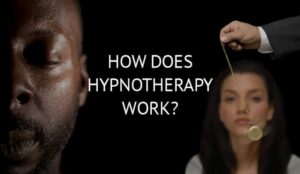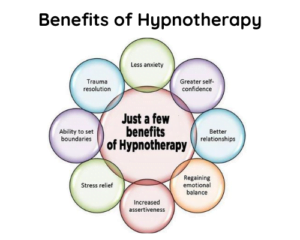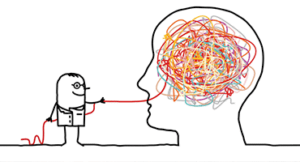Contents
- 1 What Is Hypnotherapy?
- 2 Who Is Hypnotherapy Helpful For?
- 3 How Does Hypnotherapy Work?
- 4 Who Should Try Hypnotherapy?
- 5 Side Effects
- 6 Benefits Of Hypnotherapy
- 7 When Should You Not Try Hypnotherapy?
- 8 Effectiveness Of Hypnotherapy
- 9 Mechanisms Behind How Hypnosis Works
- 10 When Is Hypnotherapy Used?
- 11 What To Expect?
- 12 Difference Between Hypnotherapy And Psychotherapy
- 13 A Word From MantraCare
What Is Hypnotherapy?
 Hypnotherapy is an alternative therapy that has been around since the 19th century. It’s a form of counseling in which the patient is guided to a relaxed state. And then given suggestions for positive change. The goal of hypnotherapy is to help patients replace their unhealthy or unwanted behaviors with healthier ones. As well as alleviate pain and other physical symptoms. In this article, we’ll explore how hypnotherapy works and who it can be helpful for.
Hypnotherapy is an alternative therapy that has been around since the 19th century. It’s a form of counseling in which the patient is guided to a relaxed state. And then given suggestions for positive change. The goal of hypnotherapy is to help patients replace their unhealthy or unwanted behaviors with healthier ones. As well as alleviate pain and other physical symptoms. In this article, we’ll explore how hypnotherapy works and who it can be helpful for.
Hypnotherapy is a powerful tool for dealing with any number of mental or physical ailments. But it can also be used to help you make better decisions. If you’re interested in learning more about hypnotherapy before trying it out on your own. Feel free to contact the professionals at MantraCare. We’ll schedule an initial consultation so that we can discuss how hypnosis might work for you. And answer any questions that are still lingering.
Who Is Hypnotherapy Helpful For?

Hypnosis can be helpful for people who want to overcome bad habits like smoking or overeating, ease muscle tension and pain, manage stress, conquer fears or stop negative thoughts. It may also benefit people who suffer from chronic conditions that are difficult to treat with medications alone. Doctors and therapists who practice hypnosis may work with patients to help them gain control over their anxieties, tension, stress, or other symptoms.
You may wonder what about side effects? Hypnotherapy is generally considered safe and has few side effects if any. However, as there’s currently little research on the long-term use of this treatment and its effects. There’s no way to say for sure.
The benefits of hypnosis have not been scientifically proven. One small, uncontrolled study found that people with chronic back pain had a statistically significant decrease in pain after being treated with hypnotherapy. However, larger-scale studies are needed before any conclusions can be made. Additional research is also needed on the mechanisms behind how hypnotherapy works and whether it is beneficial for specific conditions.
It’s important to note that anyone with psychosis, a history of mental illness, or suicidal thoughts should never receive hypnotherapy. Additionally, pregnant women and people with pacemakers or drug implants should speak to their doctors before trying this treatment.
The mind is not a vessel to be filled, but a fire to be kindled. (Plutarch)
How Does Hypnotherapy Work?

Hypnosis is a form of guided relaxation, during which the subject’s attention is focused inwardly. In this state, messages can affect the subconscious mind with greater ease and power than in a waking state. Hypnotists generally use soothing vocal tones, visual aids, or both to help patients enter into a relaxed state. This may be easier than you think. Many people feel they’re naturally good at entering this altered, focused state called hypnosis or a trance.
Once in that relaxed state, the patient is given suggestions about past experiences that are causing pain or limiting their potential. The goal is for them to change these memories so they can lead healthier, happier lives.
Who Should Try Hypnotherapy?
Hypnosis can be helpful for people who want to overcome bad habits like smoking or overeating, ease muscle tension and pain, manage stress, conquer fears or stop negative thoughts. It may also benefit people who suffer from chronic conditions that are difficult to treat with medications alone.
Doctors and therapists who practice hypnosis may work with patients to help them gain control over their anxieties, tension, stress, or other symptoms.
Side Effects
Hypnotherapy is generally considered safe and has few side effects if any. However, as there’s currently little research on the long-term use of this treatment and its effects. There’s no way to say for sure.
Benefits Of Hypnotherapy
 The benefits of hypnosis have not been scientifically proven. One small, uncontrolled study found that people with chronic back pain had a statistically significant decrease in pain after being treated with hypnotherapy. However, larger-scale studies are needed before any conclusions can be made. Additional research is also needed on the mechanisms behind how hypnotherapy works and whether it is beneficial for specific conditions.
The benefits of hypnosis have not been scientifically proven. One small, uncontrolled study found that people with chronic back pain had a statistically significant decrease in pain after being treated with hypnotherapy. However, larger-scale studies are needed before any conclusions can be made. Additional research is also needed on the mechanisms behind how hypnotherapy works and whether it is beneficial for specific conditions.
Anyone who wants to stop smoking, lose weight or conquer their fear of flying can see benefits from this treatment. Additionally, hypnotherapy can help reduce stress or pain. If you question whether hypnotherapy is appropriate for you and your situation, talk to your doctor first. Be sure to let your doctor know if you feel pressured by anyone selling hypnosis products or offering them as an alternative method of treatment. Always be mindful of any demands you may feel from the practitioner to buy other things, such as books, audio CDs, and so on.
Hypnotherapy is not recommended for pregnant women or people with pacemakers or drug implants. Because it does pose certain health risks. The treatment should also be avoided for anyone who has psychotic tendencies, a history of mental illness, suicidal thoughts, or epilepsy.
When Should You Not Try Hypnotherapy?
People with psychosis, a history of mental illness, or suicidal thoughts are usually advised not to use hypnosis. Also, pregnant women and people with pacemakers or drug implants should speak to their doctors before trying this treatment.
It’s important to note that anyone with psychosis, a history of mental illness, or suicidal thoughts should never receive hypnotherapy. Additionally, pregnant women and people with pacemakers or drug implants should speak to their doctors before trying this treatment.
If you feel that the practitioner is not experienced or competent enough for your purposes. Then it may be best to look elsewhere. You can always consult with others who have had the treatment. As well as those who haven’t to see if they would recommend a particular practitioner. Also, check with your state’s licensure department to make sure the practitioner is licensed.
Effectiveness Of Hypnotherapy

On average, hypnotherapy can be an effective treatment for certain conditions, such as stress or anxiety. However, it has not been proven to treat all conditions effectively. Further research is needed to determine whether hypnotherapy works for specific conditions. Hypnotherapy is typically safe, but there are certain instances in which this treatment may pose health risks. Pregnant women and people with pacemakers or drug implants should avoid hypnosis. The treatment is also not recommended for anyone who has psychotic tendencies. Some other conditions like a history of mental illness, suicidal thoughts, or epilepsy.
Hypnosis has not been shown to be an effective treatment for all conditions. It claims to help with and further research is needed. Especially to determine what specific conditions it can help with and what types of people it can help.
Hypnotherapy is potentially beneficial to help people control bad habits. Such as curbing smoking or overeating, or negative thinking patterns. Counseling with hypnosis has also been shown to improve and increase positive thoughts and behaviors. Some studies have shown the effectiveness of using hypnosis to treat certain conditions. Such as irritable bowel syndrome or chronic pain. Hypnotherapy has also been used in anesthesia and dentistry. It helps manage pain for longer periods of time than is usually possible without drugs.
Mechanisms Behind How Hypnosis Works
The mechanisms behind how hypnosis works are not well known. Scientific research on the topic has been limited, and many studies have been inconclusive. This is likely due to practitioners’ lack of expertise, as well as a lack of government regulation of such treatments. A new type of hypnosis called post-hypnotic suggestion therapy (PHST) is comparatively more effective than traditional hypnotherapy. PHST improves memory and motivation, making it an effective treatment for anxiety, stress control, addiction management, and weight loss.
When Is Hypnotherapy Used?
 Hypnotherapy is beneficial in managing anxiety, phobias, post-traumatic stress disorder, smoking addiction, weight loss, or weight gain. It also helps people quit smoking and lose weight. Hypnotherapy also helps to stop obsessive thoughts about food. It’s also beneficial for people with depression and PTSD. Some people use hypnotherapy to help with sleep problems. Hypnosis can also be useful for young children who are having trouble sleeping. Learning to go to the bathroom on their own, or swallowing pills.
Hypnotherapy is beneficial in managing anxiety, phobias, post-traumatic stress disorder, smoking addiction, weight loss, or weight gain. It also helps people quit smoking and lose weight. Hypnotherapy also helps to stop obsessive thoughts about food. It’s also beneficial for people with depression and PTSD. Some people use hypnotherapy to help with sleep problems. Hypnosis can also be useful for young children who are having trouble sleeping. Learning to go to the bathroom on their own, or swallowing pills.
Hypnotherapy is a type of psychotherapy that uses hypnosis as an aid in counseling or psychotherapy. Hypnotic techniques help clients relax and focus on the present. Some therapists also use hypnosis as a way to induce hallucinations. As it can be easier for some people than “conventional” forms of visualization.
What To Expect?
Hypnosis might be helpful for certain conditions, such as weight management or stress. It can also help people stop smoking or manage pain after surgery. Hypnosis might also help people with depression or anxiety.
Before a session begins, a therapist can discuss a client’s medical history and any medications he or she is taking to make sure there are no potential conflicts. The therapist will check the client’s list of medications and supplements. The client will then lie down on a couch, with eyes closed and arms resting on the sides or above their head. During hypnosis, people usually feel very relaxed and comfortable. Some clients also experience vivid imagery and sensations such as floating out of one’s body. People under hypnosis can hear everything that is happening in the room around them. But they feel relaxed enough to stay focused on their inner thoughts and imagination.
Sometimes a therapist might hold an object during a session, such as a crystal ball or a pendulum. sometimes they use words such as ‘relax’ and ‘feel’ to help the client feel relaxed during sessions.
The client or therapist can terminate the hypnosis at any time. By simply waiting until the client returns to a conscious state. Most people usually do not feel any side effects when coming out of a hypnotic state. And do not remember anything that happened during hypnosis.
Difference Between Hypnotherapy And Psychotherapy

The two therapies help to uncover hidden subconscious messages which can be causing mental or emotional problems in a person’s life. Hypnotherapy helps to make these messages conscious allowing the person to make decisions. As to which messages they would like to change and those that remain helpful.
Psychotherapy is about getting in touch with your subconscious mind and helping you understand what you need and want from life. And how it will help you fulfill your aims and goals. The outcome of psychotherapy can be life-changing for some people.
Emergence is a process of going from being deep in trance to being wide awake as if from sleep. It can happen as soon as the person comes out of trance or it may take some minutes. Especially after a long trance session.
A Word From MantraCare
Your mental health — your psychological, emotional, and social well-being — has an impact on every aspect of your life. Positive mental health essentially allows you to effectively deal with life’s everyday challenges.
If you are looking for affordable Online Counseling MantraCare can help: Book a trial therapy session


